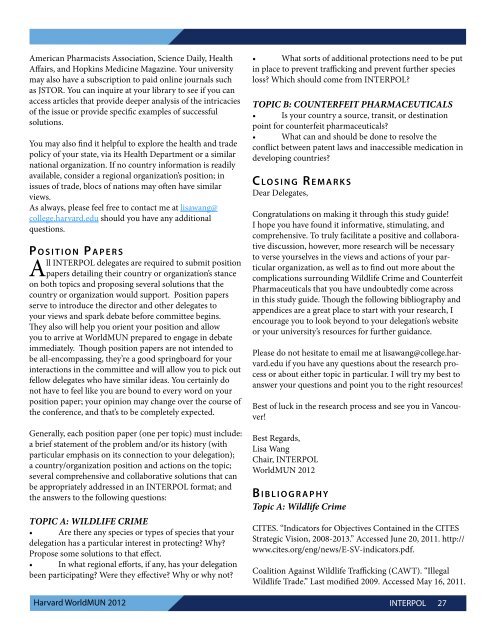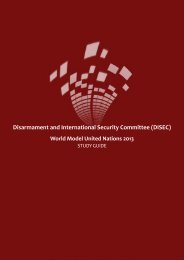INTERPOL - World Model United Nations
INTERPOL - World Model United Nations
INTERPOL - World Model United Nations
You also want an ePaper? Increase the reach of your titles
YUMPU automatically turns print PDFs into web optimized ePapers that Google loves.
American Pharmacists Association, Science Daily, Health<br />
Aairs, and Hopkins Medicine Magazine. Your university<br />
may also have a subscription to paid online journals such<br />
as JSTOR. You can inquire at your library to see if you can<br />
access articles that provide deeper analysis of the intricacies<br />
of the issue or provide specic examples of successful<br />
solutions.<br />
You may also nd it helpful to explore the health and trade<br />
policy of your state, via its Health Department or a similar<br />
national organization. If no country information is readily<br />
available, consider a regional organization’s position; in<br />
issues of trade, blocs of nations may oen have similar<br />
views.<br />
As always, please feel free to contact me at lisawang@<br />
college.harvard.edu should you have any additional<br />
questions.<br />
P OSI T I ON PAPERS<br />
All <strong>INTERPOL</strong> delegates are required to submit position<br />
papers detailing their country or organization’s stance<br />
on both topics and proposing several solutions that the<br />
country or organization would support. Position papers<br />
serve to introduce the director and other delegates to<br />
your views and spark debate before committee begins.<br />
ey also will help you orient your position and allow<br />
you to arrive at <strong>World</strong>MUN prepared to engage in debate<br />
immediately. ough position papers are not intended to<br />
be all-encompassing, they’re a good springboard for your<br />
interactions in the committee and will allow you to pick out<br />
fellow delegates who have similar ideas. You certainly do<br />
not have to feel like you are bound to every word on your<br />
position paper; your opinion may change over the course of<br />
the conference, and that’s to be completely expected.<br />
Generally, each position paper (one per topic) must include:<br />
a brief statement of the problem and/or its history (with<br />
particular emphasis on its connection to your delegation);<br />
a country/organization position and actions on the topic;<br />
several comprehensive and collaborative solutions that can<br />
be appropriately addressed in an <strong>INTERPOL</strong> format; and<br />
the answers to the following questions:<br />
TOPIC A: WILDLIFE CRIME<br />
<br />
delegation has a particular interest in protecting? Why?<br />
Propose some solutions to that eect.<br />
<br />
been participating? Were they eective? Why or why not?<br />
<br />
in place to prevent tracking and prevent further species<br />
loss? Which should come from <strong>INTERPOL</strong>?<br />
TOPIC B: COUNTERFEIT PHARMACEUTICALS<br />
<br />
point for counterfeit pharmaceuticals?<br />
<br />
conict between patent laws and inaccessible medication in<br />
developing countries?<br />
C L O S I NG REMA RKS<br />
Dear Delegates,<br />
Congratulations on making it through this study guide!<br />
I hope you have found it informative, stimulating, and<br />
comprehensive. To truly facilitate a positive and collaborative<br />
discussion, however, more research will be necessary<br />
to verse yourselves in the views and actions of your particular<br />
organization, as well as to nd out more about the<br />
complications surrounding Wildlife Crime and Counterfeit<br />
Pharmaceuticals that you have undoubtedly come across<br />
in this study guide. ough the following bibliography and<br />
appendices are a great place to start with your research, I<br />
encourage you to look beyond to your delegation’s website<br />
or your university’s resources for further guidance.<br />
Please do not hesitate to email me at lisawang@college.harvard.edu<br />
if you have any questions about the research process<br />
or about either topic in particular. I will try my best to<br />
answer your questions and point you to the right resources!<br />
Best of luck in the research process and see you in Vancouver!<br />
Best Regards,<br />
Lisa Wang<br />
Chair, <strong>INTERPOL</strong><br />
<strong>World</strong>MUN 2012<br />
B IBL I OGRA P H Y<br />
Topic A: Wildlife Crime<br />
CITES. “Indicators for Objectives Contained in the CITES<br />
Strategic Vision, 2008-2013.” Accessed June 20, 2011. http://<br />
www.cites.org/eng/news/E-SV-indicators.pdf.<br />
Coalition Against Wildlife Tracking (CAWT). “Illegal<br />
Wildlife Trade.” Last modied 2009. Accessed May 16, 2011.<br />
Harvard <strong>World</strong>MUN 2012 <strong>INTERPOL</strong> 27

















